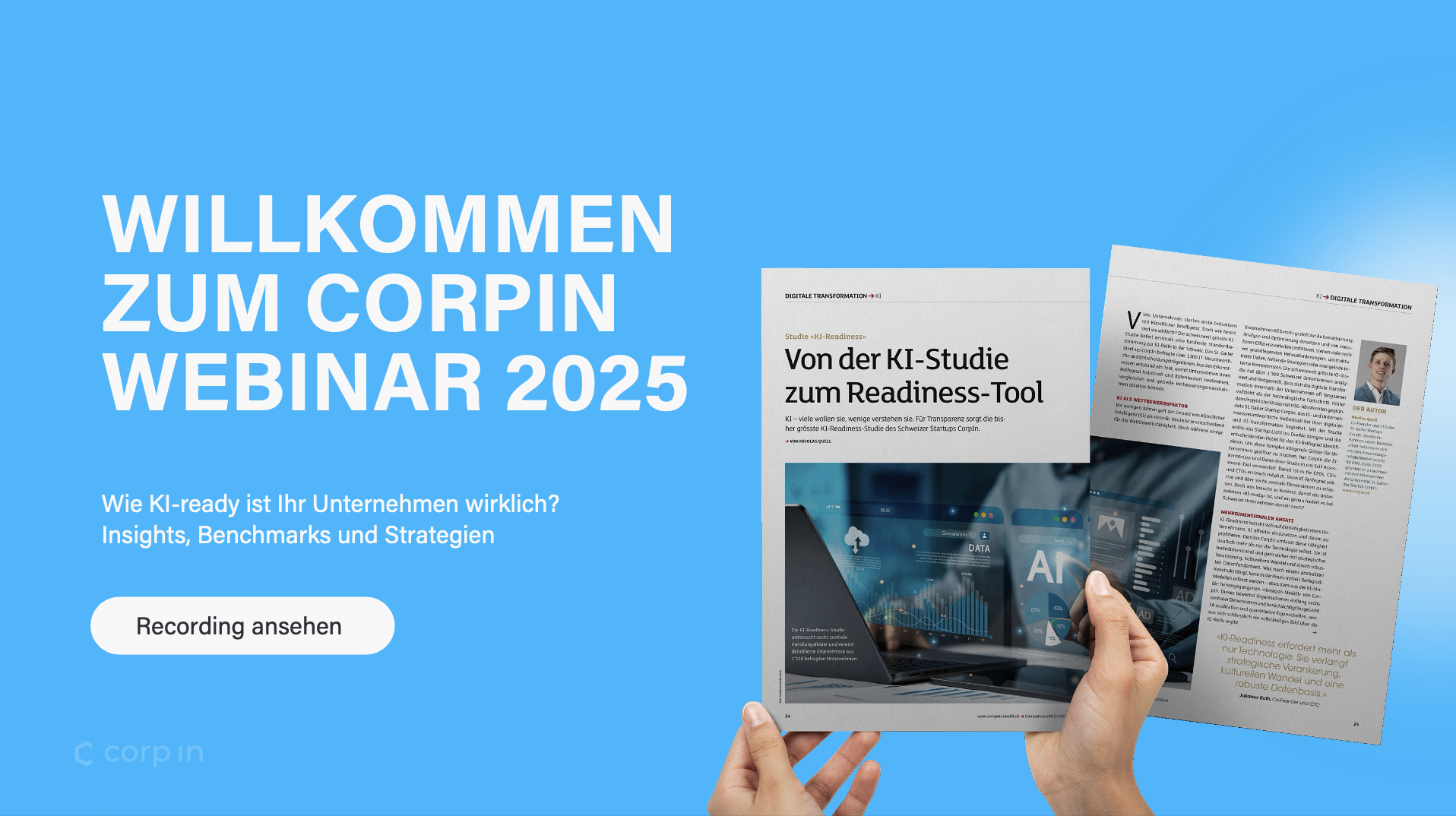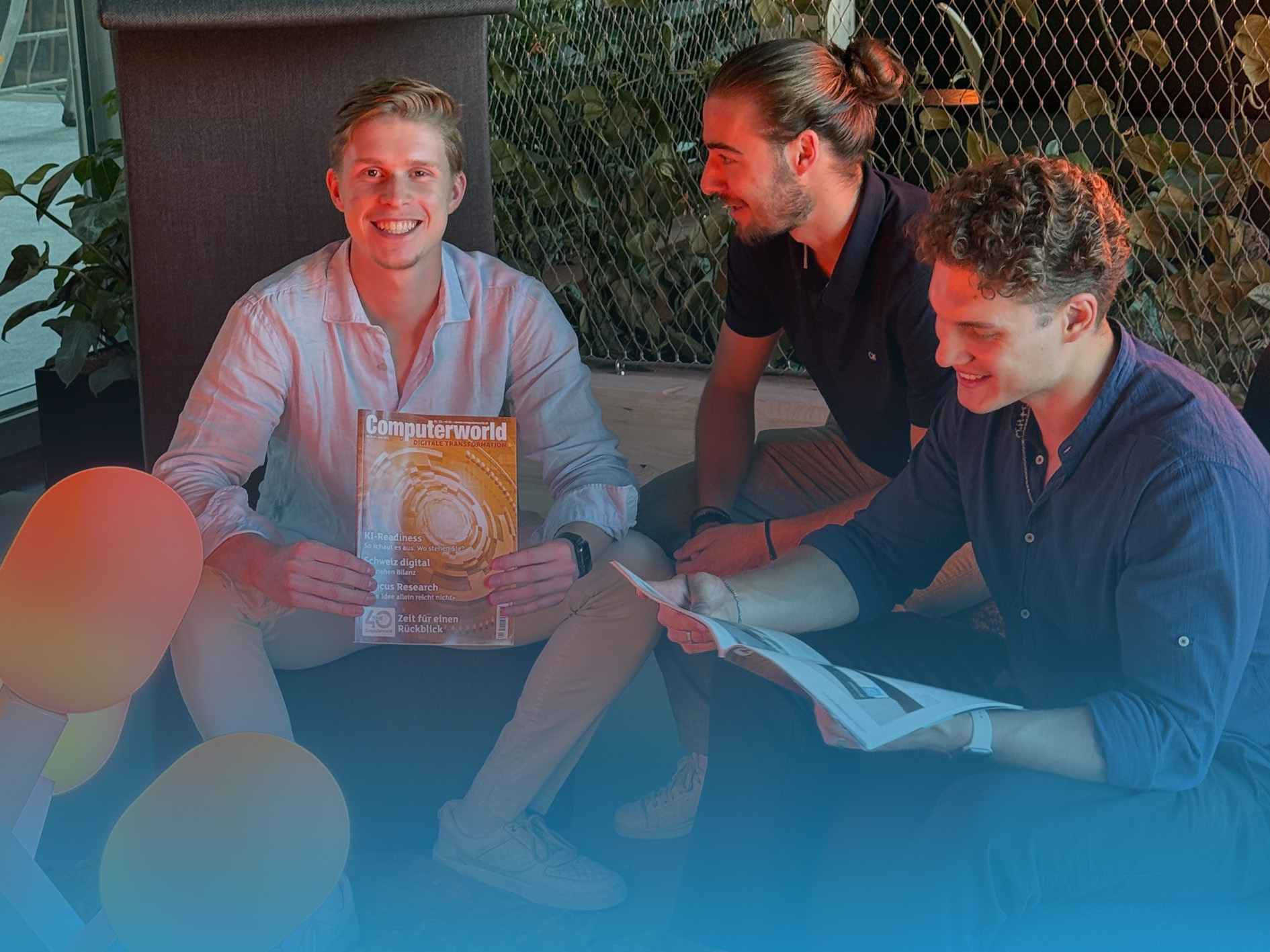AI-Readiness? Let's Get Real - A fully AI-generated (VEO3) campaign from CorpIn

Authored by

June 3, 2025
From artificial intelligence in the company to creative AI advertising: the St. Gallen-based company CorpIn, which specializes in AI consulting and AI solutions for companies, was one of the first in Europe to implement a fully AI-generated marketing campaign. Under the motto "AI-Readiness? Let's Get Real", eight video spots (available here) were created entirely using AI - from the script and storyboard to animation, sound design and voiceovers. This was made possible by Google's latest generative AI technology Veo 3, which generates realistic videos including suitable audio accompaniment based on short text descriptions. The campaign addresses decision-makers at C-level, in IT and digitalization and provocatively poses the question: How AI-ready is your company really? It is not only a milestone for AI in marketing, but also subtly highlights the benefits of CorpIn's new Hexagon platform for measuring AI maturity.
Between hype and reality: why AI readiness is crucial
Digital transformation with AI is at the top of many companies' agendas - but there is often a gap between aspiration and reality. The first pioneers are already using artificial intelligence specifically for automation, data analysis and AI process optimization. In production, for example, AI enables predictive maintenance and in the office sector it supports knowledge management. Nevertheless, unstructured data, a lack of AI strategy and a lack of internal expertise are slowing down progress in the digital transformation at many companies. According to the Swiss AI Report 2025, only 25.9% of Swiss companies already classify themselves as "advanced" in their use of AI - almost three quarters are in the middle or lower range. These figures make it clear: It is not enough to launch AI pilot projects; companies must be able to realistically assess where they stand in terms of their AI capability. This is exactly where the term AI readiness comes in - and this is where CorpIn's "Let's Get Real" campaign comes in by holding up a mirror: Many think AI is important, but where does your company really stand?
"Many companies consider AI to be important, but often don't know how well prepared they actually are. With the Hexagon platform, we have developed a tool that makes precisely this visible - and provides guidance where previously there was only a gut feeling."
- Nicolas Quell, CEO of CorpIn
Fully AI-generated: The campaign "AI-Readiness? Let's Get Real"
What happens when an AI becomes an advertising agency? CorpIn tried it out - with impressive results. The campaign "AI-Readiness? Let's Get Real" campaign consists of eight entertaining video clips that take a tongue-in-cheek look at typical situations and challenges on the way to becoming an AI-enabled organization. Each spot holds up a realistic mirror to the business world. The special feature: All videos were created entirely using generative AI. Google Veo 3 - presented at Google I/O 2025 - made it possible to generate not only synthetic images, but also the matching voiceovers, sound effects and backgrounds. "We're entering a new era of creation," explained Google's AI boss Josh Woodward at the launch of Veo 3, describing the results as "incredibly realistic". It is precisely this technology that CorpIn has used to produce professional-looking videos without human actors or camera crews - faster and more flexibly than ever before.
In terms of content, the clips cleverly play with expectations and reality: they show exaggerated characters - completely AI-generated, but deceptively real-looking - in typical company scenarios. For example, they humorously show how a company believes it is already "AI-ready" simply because it is testing a single AI application, while basic homework is missing in the background. Through these exaggerated examples, the campaign conveys a clear message: artificial intelligence in the company only generates real added value if the status quo is honestly analyzed and built on a solid foundation - in other words, if AI readiness really exists.
What is exciting is that none of the videos directly promote the Hexagon platform. Instead, "Let's Get Real" creates an "aha" experience for the audience through the stories. Decision-makers may recognize themselves or their organization and involuntarily ask themselves: "Are we really ready for AI?" This question leads directly to CorpIn's offer - without it having to be boldly stated. The campaign passively directs interest to CorpIn's Hexagon framework by raising awareness of holistic AI readiness. At the end of each video, a discreet reference is made to the Hexagon platform, where you can check your own level of AI maturity. In this way, CorpIn bridges the gap between the aha moment and action: from an entertaining commercial to a self-assessment tool that companies can use to measure their AI fitness based on data.
Hexagon: The AI maturity model (hexagon framework) in six dimensions
CorpIn's Hexagon platform is at the heart of the campaign - a Swiss solution for holistic AI benchmarking and strategic AI development. It is based on a scientifically sound six-dimensional framework, developed in close collaboration with research and practice. Over 1,300 decision-makers from Swiss companies were asked about their AI status at the beginning of 2025; this data forms the empirical foundation of the model. The result: Hexagon is the first tool to comprehensively and objectively determine a company's AI maturity level - broken down into six key dimensions that together provide a holistic picture of AI readiness. These dimensions are:
- Data foundation: quality, availability and consistency of data. Without a valid, structured database, even the best AI cannot deliver added value. The Swiss AI Report 2025 showed that only 8% of companies have a consistent data structure throughout - there is often some catching up to do here.
- Strategic objectives: Anchoring AI in the overall strategy and clear target definitions. AI projects must contribute to measurable goals and be supported by top management. In fact, only 13% of companies work with clearly defined AI KPIs - without such guidelines, the introduction of AI remains piecemeal.
- Organizational culture: Openness of the culture towards digitalization and AI. An innovation-friendly culture that is open to learning is essential for reducing fears and embracing change. Training and open communication - for example through AI workshops for companies - strengthen employee acceptance.
- Technical requirements: Powerful IT infrastructure and tools as the basis for AI. These include scalable systems, sufficient computing power and seamless integration into existing processes. If you want to use AI in production, for example, you need compatible machines, sensors and networked platforms - otherwise predictive maintenance is just theory.
- Security & privacy: Responsible handling of data and AI. This includes the protection of sensitive information, compliance with data protection rules and transparent, ethical use of AI. Without trust in the technology and its governance, widespread implementation will fail.
- Awareness & competence: Know-how and awareness of AI at all levels. Does management understand the opportunities and limitations of AI? Are there experts or partnerships in place to implement AI projects? Do employees receive further training, for example on how to use ChatGPT in the company and other tools? AI can only be sustainably anchored through continuous skills development.
Hexagon uses these six categories to create a differentiated profile of the strengths and weaknesses of each company's own AI readiness. In contrast to simple self-tests that only highlight individual aspects, Hexagon offers a holistic view - hence the name Hexagon (six corners for six dimensions). The tool provides industry-specific benchmarks for comparison with similar companies and generates specific recommendations for action based on the results. This allows you to recognize immediately in which areas there is an urgent need for action and where you are already well positioned. This combination of self-diagnosis, benchmarking and strategy derivation is unique in Switzerland to date and underlines CorpIn's thought leadership position in the field of AI strategy and corporate digitalization.
Conclusion: AI excellence starts with honesty
With the campaign "AI-Readiness? Let's Get Real" campaign and the Hexagon platform, CorpIn impressively demonstrates what it means to use artificial intelligence strategically in the company - namely with a sense of proportion and a holistic approach. Instead of blindly following the hype, CorpIn demonstrates a way in which companies can approach their AI transformation in a well-founded manner. On the one hand, it becomes clear that an honest assessment of one's own AI maturity is the first step in driving forward the digital transformation with AI in a targeted manner. Secondly, CorpIn's fully AI-generated campaign demonstrates the power of modern AI technologies in practice - and in its own marketing strategy.
For decision-makers, this delivers a double message: firstly, you should use the new AI tools boldly and innovatively (such as CorpIn with Google Veo 3 in marketing). Secondly, the foundation must not be neglected - data, strategy, culture, infrastructure, security and skills must work together for AI projects to be scalably successful. CorpIn speaks in the language of business and addresses real pain points, which reflects the tone of the campaign as well as the direction of the Hexagon platform.
As a pioneer of a new generation of consulting and solutions, CorpIn invites companies to become active. Take the opportunity to test your company's AI maturity level yourself with just a few clicks on the Hexagon platform - data-based and valuable as a basis for your future AI strategy. In the spirit of "Let's Get Real", vague assumptions can become clear certainties. Because in the end, AI excellence starts with honesty - and with the will to derive the right steps from findings.
The content of this article may have been improved with the help of artificial intelligence. Therefore, we cannot guarantee that all information is complete and error-free.




